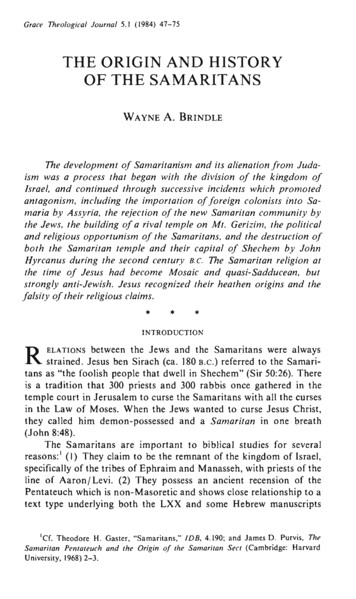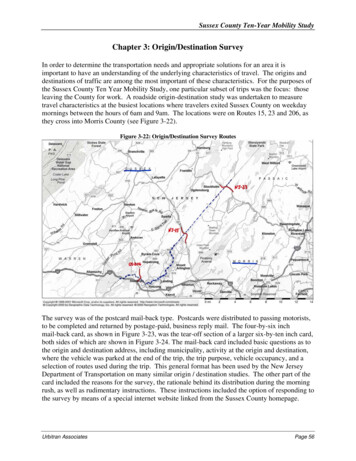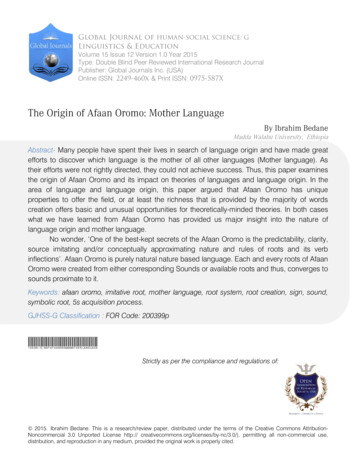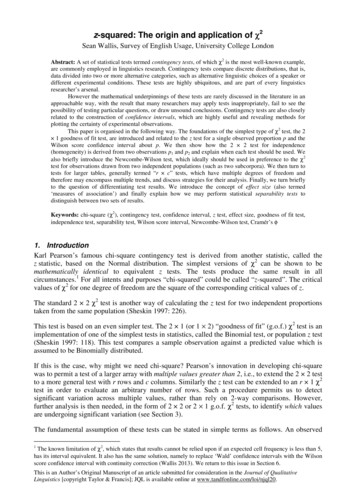
Transcription
Grace Theological Journal 5.1 (1984) 47-75THE ORIGIN AND HISTORYOF THE SAMARITANSWAYNEA.BRINDLEThe development of Samaritanism and its alienation from Judaism was a process that began with the division of the kingdom ofIsrael, and continued through successive incidents which promotedantagonism, including the importation of foreign colonists into Samaria by Assyria, the rejection of the new Samaritan community bythe Jews, the building of a rival temple on Mt. Gerizim, the politicaland religious opportunism of the Samaritans, and the destruction ofboth the Samaritan temple and their capital of Shechem by JohnHyrcanus during the second century B.C. The Samaritan religion atthe time of Jesus had become Mosaic and quasi-Sadducean, butstrongly anti-Jewish. Jesus recognized their heathen origins and thefalsity of their religious claims.***INTRODUCTIONbetween the Jews and the Samaritans were alwaysR strained. Jesusben Sirach (ca. 180referred to the SamariELATIONSB.C.)tans as "the foolish people that dwell in Shechem" (Sir 50:26). Thereis a tradition that 300 priests and 300 rabbis once gathered in thetemple court in Jerusalem to curse the Samaritans with all the cursesin the Law of Moses. When the Jews wanted to curse Jesus Christ,they called him demon-possessed and a Samaritan in one breath(J ohn 8:48).The Samaritans are important to biblical studies for severalreasons: 1 (1) They claim to be the remnant of the kingdom of Israel,specifically of the tribes of Ephraim and Manasseh, with priests of theline of Aaron/ Levi. (2) They possess an ancient recension of thePentateuch which is non- Masoretic and shows close relationship to atext type underlying both the LXX and some Hebrew manuscriptsICf. Theodore H. Gaster, "Samaritans," IDB, 4.190; and James D. Purvis, TheSamaritan Pentateuch and the Origin oj the Samaritan Sect (Cambridge: HarvardUniversity, 1968) 2-3.
48GRACE THEOLOGICAL JOURNALamong the Dead Sea Scrolls, and are therefore important both fortextual criticism of the OT as well as the study of the history ofHebrew. (3) They appear several times in the NT, especially in Luke,John, and Acts, and may provide the background for controversiesrelated in Ezra, Nehemiah, and other post-exilic writings. (4) Theyprovide much insight into the cosmopolitan nature of Palestinianreligion and politics before and at the time of Christ. (5) At one timethe community was large enough to exercise considerable influence inPalestine, Egypt, Syria, and even Rome. (6) And they were importantenough to be a subject of controversy in Josephus and Rabbinicliterature (notable among which are many references in the Mishnahand an extra tractate in the Talmud).The principal questions addressed in this study are: (l) Whendid the Samaritan sect come into existence as a distinct ethnic andreligious group, with its own traditions and teachings? and (2) Whatwas the development and history of the enmity between Samaritansand Jews?The sources for a history of the Samaritans are predominantlyanti-Samaritan: 2 Kings 17; Ezra and Nehemiah; Sir 50:25-26; 2 Macc6:2; the Assyrian Annals of Sargon; the Elephantine Papyri; theMishnah; the Babylonian Talmud (Masseket Kutim); the New Testament (Matthew, Luke, John, Acts); and Josephus (especially Ant 9,1 ], 12, 13, 18, 20). 2 Samaritan literature is largely late; the SamaritanPentateuch, however, though copied in the 14th century, dates backin recensional form at least to the Hasmonean period (ca. 100150 B.C.). Many of its peculiarities reflect Samaritan religious tendencies, and it is thus an early witness to their beliefs and claims.The problem of sources is compounded by the fact that the name"Samaritan" occurs only once in the OT (2 Kgs 17:29-translated inthe NASB as "the people of Samaria"), and there it refers not to the"Samaritans" as they appear in the Talmud, Josephus, and the NT,but rather to the people of the Northern Kingdom of Israel before itscaptivity by Assyria! An accurate understanding of the Samaritans asa religious people must therefore depend on much more than a simpleidentification based on names and geography.I. THEORIES OF SAMARITAN ORIGINSThe traditional theories of Samaritan origins are reduced byPurvis to four basic positions: 3 (1) the view of the Samaritans themselves, that their movement is a perpetuation of the ancient Israelite2A. Gelston. "Samaritans." New Bible Dictionary (Grand Rapids: Eerdmans. 1962)1132.3James D. Purvis. Samaritan Pentateuch. 4-5.
BRINDLE : THE SAMARITA NS49faith as it was practised in the pre-monarchical period at Shechem(ca. 1400-1100 B.C.); (2) the counterclaim of Judaism, that Samaritanism is a heresy derived from a corrupt worship of Yahweh whichdeveloped in northern Palestine after the Assyrian conquest of thatarea about 722 B.C.; (3) an interpretation based on Ezra, Nehemiah,and Josephus, that the Samaritans broke away from the Jews in thePersian period; and (4) the assertion that a Samaritan schism occurredin the early Greek period.All views demonstrate that there was a definite schism,4 followedby a long period of independent development of the two groups. TheSamaritans place the schism in the twelfth century B.C., at the time ofEli. The Jews date it in the eighth century B.C.Modern critics have tended to date the schism much later, butmost have retained the schism concept. Some scholars, however, havebegun to question this notion. As Coggins points out:Two points in particular have remained characteristic of many descriptions: the view of Samaritanism as a debased form of religion, containing many syncretistic elements; and the notion of a schism-with itstwofold connotation, of a definte break that took place at a specificmoment in history, and of that break as implying the departure of theschismatic from the accepted norm . It is hoped that it will becomeclear that neither of these features should be taken for granted as trulycharacteristic of the situation. 5Purvis stresses that "the so-called Samaritan schism, or withdrawalfrom the mainstream of Judaism, was not so much an event as aprocess-a process extending over several centuries and involving aseries of events which eventually brought about estrangement betweenthe two communities.,,6 Historians have tended to select one eventand to declare that it was this that caused the emergence of theSamaritan sect. They have also disagreed as to which element ofSamaritanism represents its crucial distinction from Judaism. TheSamaritans, for example, say that worship at Gerizim rather thanelsewhere has always been the determining factor. The Jews regardthe intermarriage of Assyrian colonists and northern Israelites andthe development of a syncretistic religion as the origin of the heresy.Others refer to the erection of a temple on Mt. Gerizim, or the rejection of the post- Pentateuchal scriptures, as the crucial event.The thesis of this article is that the origin of Samaritanism wasindeed a process-a process which began at least with the division ofthe kingdom (by ca. 931 B.C.) and continued through each successive4R. J. Coggins, Samaritans and Jews (Oxford: Blackwell, 1975) 7.5Ibid.,4.6Purvis, Samaritan Pentateuch, 5.
50GRACE THEOLOGICAL JOURNALincident, including the importation of foreign colonists and the building of the Gerizim temple, right up to their final excommunication bythe Jews about A.D. 300. Thus even in NT times the process ofestrangement was still going on, although the sect could surely beconsidered distinct once it had its own temple and worship onGerizim.Most modern critics tend to minimize the OT's witness to theorigin of the Samaritan people and religion, assuming that such"Jewish" accounts are too prejudiced to be reliable. This attitudemust be avoided, however, since the statements of Jesus Christ showthat he also recognized the dubiousness of their origins and the falsehood of their religious claims.II. THE SAMARITAN ACCOUNTThe Samaritans claim to be the true children of Israel, who haveremained faithful to the Law of Moses. 7 The Torah in their hands is"the true, original and faultless Torah in all its sentences, pronunciations, and its style.,,8The Samaritans claim to be descendants of the tribe of Joseph,and thus descendants of Ephraim and Manasseh. Their priests arefrom the house of Levi, descendants of Aaron. When Israel enteredPalestine, Joshua established the center of his administration atShechem, in the valley between Mount Gerizim and Mount Eba1. 9The high priest at the time was Eleazar, son of Aaron, who also livedin Shechem. Six years after the entrance into the land, Joshua builtthe Tabernacle on Gerizim, where all worship of the Israelites wascentered.After Joshua's death there was a succession of kings (calledC'tn:nv, "judges," by the Jews), the last of whom was Samson. Eleazarwas succeeded at Gerizim by Phinehas, Abishua, Shesha, Bacha, andUzzi.When Uzzi became high priest at the age of 23, Eli (a descendantof Ithamar rather than of Eleazar lO ), then 60 years old, was directorof revenues and tithes and director of the sacrifices on the stone altaroutside the Tabernacle. I I Eli became rich through revenues and jealousof Uzzi, and he decided to take the high-priesthood away from Uzzi.7 Jacob, Son of Aaron, "The History and Religion of the Samaritans," BSac 63(1906) 393.8 lb id.9 John MacDonald, The Theology of the Samaritans (Philadelphia: Westminster,1964) 16.lOPurvis, Samaritan Pentateuch, 88, n. I.IIJacob, "History," 395.
BRINDLE: THE SAMARITANS51About the time of Eli, foreigners began to enter Israel and toteach the people sorcery and magic. Even a large number of priestslearned it and left the ways of God. Eli was one of these, and hegathered a group of supporters. One day Uzzi the high priest rebukedEli for some fault in his sacrificial work, and Eli with his followersimmediately apostatized.1 2 Some of Israel followed Uzzi (especiallythe tribes of Joseph), and some followed Eli (especially Judah andBenjamin).Eli moved to Shiloh and took copies of the Law with him. Therehe made a counterfeit ark and tabernacle and set up a rival sanctuary.He claimed that God had commanded the tabernacle to be moved toShiloh from Gerizim. A majority of the people of Israel began tofollow Eli because of his sorcery, and a deep dissension began togrow between the two groups. Thus, for a time there were two sanctuaries and two priesthoods (one descended from Phinehas, the otherfrom Ithamar), and the first division on religious grounds in Israelwas created. 13 The Samaritans thereafter rejected the claims of theIthamar branch of priests in favor of the sons of Phinehas. As a resultof Eli's defection, Israel was split into three divisions: (I) the followersof Uzzi, the genuine high priest; (2) the followers of Eli; and (3) manyof various tribes who lapsed into paganism.This is the only schism that the Samaritans know. 14 Eli's actended the era of divine favor (:1lJ':l1, "Rahuta") and initiated the ageof divine wrath (:1lJ'l , "Panuta").One day God told Uzzi to put all of the vessels and furniture ofthe tabernacle into a nearby cave, after which the cave miraculouslyclosed up, engulfing the entire sanctuary. The next day, the cave andits contents completely disappeared (not to be found again until theTaheb or Messiah comes).15About this time, Samuel, a descendant of Korah, came to livewith Eli at Shiloh. Eli taught him all his evil ways, including sorceryand witchcraft. When Eli died, the people made Samuel their ruler.The Philistines took advantage of the corruption and division toattack Israel. The people demanded a king, so Samuel appointedSaul.Saul determined to punish the tribes of Joseph because they didnot follow Samuel's cult in Shiloh, so he went to Shechem anddestroyed the remaining altar on Gerizim, killed the high priest Shisha(son of Uzzi), and destroyed many of the tribe. 16 They began to'2 Ib id., 397.13MacDonaId, Theology, 17.'4 Purvis, Samaritan Pentateuch, 88, n. I.'5MacDonaId, Theology, 17.'6Jacob, "History," 406-7.
52GRACE THEOLOGICAL JOU RNALworship in their homes, and many moved to Bashan, east of the Seaof Galilee. But the Torah was kept in its original condition.After Saul died, David came to Shechem and became king of allIsrael. He captured Jabish (Jerusalem) and moved Eli's ark there.When David decided to build a temple in Jerusalem, the high priestat Gerizim, Yaire, told him that he would have to build it on·Mt. Gerizim instead, according to the Torah. So David, who was afriend of this high priest (cf. 1 Sam 21: 1-7) and had always offeredhis tithes at Gerizim, refrained from building the temple and left it forhis son to do. Solomon built the temple in Jerusalem and led thepeople astray from God. Jeroboam later rebelled and led Israel evenfurther astray. He made his capital in Sabastaba l7 (Sebaste, latercalled Samaria).There were now three groups of Israelites: (I) the Samaritans,who kept themselves distinct from the rest and called themselvesC"'}7?W, keepers of the Law; (2) the Israelites of the north, who followed Jeroboam; and (3) the tribe of Judah, with a mixture of variousother tribes, who followed the line of David. lsAssyria finally captured the Northern Kingdom and enslaved thepeople. An Assyrian named Samar controlled Sabastaba, and anIsraelite (of the tribe of Joseph) bought the city and it became knownas Samaria. Its inhabitants thus became known as Samaritans. 19Some of the followers of Uzzi were also taken into captivity bythe Assyrians. Later, Nebuchadnezzar deported people from all tribes(including the tribe of Joseph) to Babylon. Foreigners immigrated toIsrael in order to settle, but had problems with famine and wildbeasts. So Cyrus sent the "Samaritan" high priest Abdullah (orAbdeeo), along with a host of descendants of Joseph, back to theLand. Abdullah wanted to build a sanctuary on Gerizim, but Zerubbabel the Jew wanted to rebuild in Jerusalem. Abdullah appealed tothe Torah, whereas the Jews appealed to David and Solomon. Cyrussided with the Samaritans, honored Sanballat their governor, andallowed many from the tribe of Joseph to return and to build atemple on Gerizim.Enmity between the tribes of Joseph and Judah continued togrow. Zerubbabel bribed the King of Persia to allow the Jews tobuild a temple in Jerusalem, but the Samaritans then received permission to destroy what they had built. This caused yet greater division.17 Ib id., 414; actually, it was Herod the Great who gave it the name Sebaste, whichis Greek for Augustus.18MacDonald, Theology , 18.19 Jacob, "History," 415.20 Ay. L., "Samaritans," Encyclopaedia Judaica, 14.728.
BRINDLE: THE SAMARITANS53Ezra (the "accursed Ezra,,21) finally obtained a second decree(through Esther and by means of witchcraft) from King Ashoresh(Ahasuerus) to rebuild the temple and the city of Jerusalem and toexercise authority over all the Land. Since the Jews had lost theTorah and all their books, Ezra began to collect legends and narratives and invented many things which never occurred. He falselyclaimed (in 2 Kings 17) that the Samaritans were Gentiles with falsegods (cf. Ezra 4). He also invented the idea, popular among laterrabbis, that the Samaritans call Ashina (or Ashima) their god, whereasin reality they simply substitute the word "Shimeh" (from OW, "name")for YHWH, in the same way that the Jews use the substitution word,' , , "Adonai,,).22 Ezra wrote in the "Assyrian" language (Aramaic),whereas the Samaritans retained Hebrew. Ezra was wicked and corrupted the Jews even more, and by persecutions and lies caused muchof the hatred between the Jews and Samaritans. These persecutionskept the Samaritan nation small, but Samaritans still claim to carryout the ancient customs according to the Mosaic Law. 23Thus, Judaism is an extension of Eli's heresy through Samuel,Saul, David, the Judean monarchy, and Ezra, with the rival cultshifting from Shiloh to Jerusalem and later developing a completetradition on which to base it. The true Samaritan claims were dismissed with slander and persecution.Several things may be said concerning this account by theSamaritans of their own history. Purvis declares that "to accept theSamaritan claim at face value would be extraordinarily naive. ,,24 Mostof their sources are extremely late, although their later chronicles domake use of earlier ones. 25In their favor, however, is the fact that at regular intervals beforethe divided monarchy, all twelve tribes gathered at Shechem to worship their common God. 26 It was to Shechem that Rehoboam went tobe anointed king of all Israel (I Kgs 12: 1). Jeroboam built up Shechemas his first capital (1 Kgs 12:25). Gerizim was mentioned as a sacredmountain in Deuteronomy (11:29; 27: 12), whereas Jerusalem andMt. Zion were chosen much later.Jeroboam also corrupted the priesthood by making priests ofnon-Levites (l Kgs 12:31; 2 Chr 13:9). It may be questioned whetherany of the legitimate priests decided to separate from Jeroboam's21 Gaster, "Samaritans," 191."History," 424.23Ibid., 426.24Purvis, Samaritan Pentateuch, 92.25Ibid., 90.26Salo W. Baron, A Social and Religious History of the Jews, 2nd ed. (New York:Columbia University, 1952) 1.61.22 Jacob,
54GRACE THEOLOGICAL JOURNALapostate system in order to preserve the true worship of Yahweh.(Such priests may have simply gone south to Jerusalem, however.) Itis not known whether the priesthood in northern Israel survived theAssyrian conquest. 27 But it does seem certain that "only a very smallpercentage of the Samaritan, or northern Israelite, people were exiled,to judge from Sargon's own account, and he makes no mention ofany religious groups. ,,28All of these factors may be explained by the assumption thatwhen the Samaritan sect finally developed its own identity and organization (during the last centuries B.C.), it was forced to reinterpretIsraelite history in order to validate its claims to be the true remnantof Israel. The peculiarities of the Samaritan Pentateuch (which seemto be rather transparent alterations) also support this hypothesis. Theprogress of divine revelation in both testaments also supports thisview, for, as Jesus himself said, "Salvation is from the Jews"(John 4:22).III. THE ORIGIN OF THE SAMARITAN PEOPLEThe Name "Samaritan"About 875 B.C., Omri founded the city of Samaria on a hillabout seven miles northwest of Shechem. 29 He bought the hill from aman named Shemer for two talents of silver, built a fortified city, andcalled it Samaria (yi'7?itV), after the name of the previous owner(1 Kgs 16:24). Shemer was apparently a widespread clan name inIsrael. 30Samaria became the capital of the northern kingdom and remained the capital until its destruction by Alexander the Great(ca. 332 B.C.). The capital soon gave its name to the entire nation (cf.I Kgs 13:32; Hos 8:5; Amos 3:9; Isa 9:9-12). Subsequently, the nationgave its name to its inhabitants, the Samarians.27 Ay. L., "Samaritans," 727.28John Bright, A History of Israel, 2nd ed. (Philadelphia: Westminster, 1972) 236;G.Ernest Wright, Biblical Archaeology (Philadelphia: Westminster, 1957) 152; James L.Kelso, "Samaria, City of," Zondervan Pictorial Encyclopedia of the Bible, 5.232. Thedate is not certain; cf. Eugene H. Merrill, An Historical Survey of the Old Testament(Grand Rapids: Baker, 1966) 251; Gaalyah Cornfeld and David N. Freedman, Archaeology of the Bible: Book by Book (San Francisco: Harper and Row, 1976) 119;Edwin R. Thiele, The Mysterious Numbers of the Hebrew Kings, rev. ed. (GrandRapids: Zondervan, 1983) 36, 88, who, among others, would date the founding ofSamaria ca. 880 B.C.29 James L. Kelso, "Samaria, City of." Zondervan Pictorial Encyclopedia of theBible, (Grand Rapids: Zondervan, 1975) 5.232.30James A. Montgomery, The Samaritans (New York: Ktav, 1968) 317.
BRINDLE: THE SAMARITANS55Yet the name c' "1?'llJ ("Samaritans") occurs only once in theentire OT (2 Kgs 17:29), and there it refers not to the so-called "mixedrace" who appear in the NT, but rather to the former inhabitants ofSamaria, many of whom were carried off into exile. As Unger states:It is customary to refer "Samaritans" in this passage to the colonistsbrought by the king of Assyria in place of the deported Israelites; butthe text seems rather to mean that these colonists put their gods intothe houses of the high places which the "Samaritans," i.e., the formerinhabitants of Samaria, had made for their own religious use . 31Indeed, Coggins claims that "there are no unambiguous referencesto the Samaritans in the Hebrew Old Testament. ,,32 The LXX hasl:UJlUPEl'tUt, again only at 2 Kgs 17:29. This word also occurs inJosephus and the NT, and from it the English form is derived.The more usual name found in Josephus and the Talmud isKutim or Cutheans, which refers to one of the groups of foreigncolonists mentioned in 2 Kgs 17:24, 30. This name, of course, emphasizes the supposed heathen origins and syncretistic practice of theSamaritans. Another name used several times by Josephus is "Shechemites" (l:tKtJll'tUt)/3 a name which refers to their principal city.Josephus also says that the Samaritans of the Hellenistic periodcalled themselves "Sidonians in Shechem" when they wanted to dissociate themselves from the Jews and win the support of AntiochusEpiphanes. 34On the other hand, the Samaritans themselves do not use thesedesignations at all. Usually they call themselves "Israel. ,,35 But theyalso frequently use the term C'11?W 36 or P11?W, 37 which they contendmeans "keepers" or "observers" of the truth, the Law of God, derivedfrom the verb ' W (to guard or observe). The use of this term isadmitted early, since it was known by Epiphanus (A.D. 375) andOrigen (ca. A.D. 240).38 Ewing suggests that a derivative of ' W would31 Merrill F. Unger, Unger's Bible Dictionary, 3rd ed. (Chicago: Moody, 1966) 958.32Coggins, Samaritans, 9.33Josephus, Ant. 11.8.6.34Josephus, Ant. 11.8.6; 12.5.5.35Coggins, Samaritans, 10.36Ay. L., "Samaritans," 728.37Shemaryahu Talmon, "The Samaritans," Scientific American (January, 1977)104.38Epiphanius, Panarion 9.1; Origen, Homily on Ezekiel 9.1-5; Commentary onJohn 20.35; cf. G. W. H. Lampe, ed., A Patristic Greek Lexicon (Oxford: Clarendon,1961) 1222; N. R. M. de Lange, Origen and the Jews (Cambridge: Cambridge University, 1976) 36; Coggins, Samaritans, II.
56GRACE THEOLOGICAL JOURNALhave fit even the city of Samaria in the sense of "outlook," since ithad a commanding view of the Plain of Sharon. 39The suggestion has· also been made that there is an allusion tothe Samaritan self-designation in 2 Chr 13: 11, where King Abijah ofJudah condemns the Northern Israelites with the phrase "we arekeepers [O,, ;tzj] of the charge of the Lord our God, but you haveforsaken Hi . ,,40 This speech comes shortly after the division of thekingdom in Chronicles and perhaps may be seen as Abijah's declaration of the "Jewish monopoly of salvation. ,,41 Abijah also emphasizesthe true priesthood at Jerusalem, contrasting it with the illegitimatepriesthood of Northern Israel which served false gods. The suggestionof some critics is that the author of Chronicles inserted or used thisallusion as a polemic against the Samaritan system of his own day.42The use of the term here is striking, but in the complete absenceof other evidence, it is doubtful that the technical use of the term wascurrent at such an early date. It is more likely that the connectionwith "keeping" the law was a reaction against the pejorative use of thename "Samaritan" by the Jews in Rabbinic or later times.The Samaritan PeopleWhen Jeroboam declared himself king of Israel, his kingdomincluded the entire northern two-thirds of the earlier kingdom ofSolomon, from Bethel in the south to Dan in the north, with authority stretching probably to the Euphrates River (l Kgs 4:24).43 Thisdominion was quickly 10st,44 however, and during the Assyrian invasions of the ninth and eighth centuries B.C., Israel lost progressivelymore territory.45 Finally in 722/21 B.C., the city of Samaria was takenafter a three year siege. 46The fall of Samaria . marked a new era in the history of thenorthern kingdom. The leading citizens were deported by Sargon, whileexiles from other parts of the Assyrian Empire were imported bySargon, Esarhaddon, and Ashurbanipal. 4739W . Ewing, "Samaria," ISBE(Grand Rapids: Eerdmans, 1939) 4.2671.4 Coggins, Samaritans, II.41 lb id.42lbid.43Yohanan Aharoni and Michael Avi-Yonah, The MacMillan Bible Atlas (NewYork: MacMillan, 1968) 68.44 Ib id., 76.45Ibid., 86-97.46Ewing, "Samaritans," 2672.47 A. Gelston, "Samaritans," The New Bible Dictionary (Grand Rapids: Eerdmans,1962) 1131.
57BRINDLE: THE SAMARITANSSargon carried off 27,290 people, as he recounted in his annals,48probably mostly influential people from the city of Samaria itself.Yamauchi estimates that 500,000 to 700,000 people lived in Israel atthis time. 49 Thus Sargon neither desolated nor depopulated the land;he merely took away its independence and its leading citizens. In720 B.C. Samaria, together with Arpad, Simyra, and Damascus, joinedin a revolt against Assyria headed by Hamath. 50 It is likely that largescale deportations were carried out by Sargon as a result of this andsimilar revolts. 51According to 2 Kgs 17:24, "the king of Assyria brought men fromBabylon and from Cuthah and from Avva and from Hamath andSephar-vaim, and settled them in the cities of Samaria in place of thesons of Israel." If these were limited mainly to the vicinity of the cityof Samaria, this would account well for the fact that the Galilee ofNT times remained a Jewish region. 52The conquests of several of these nations were referred to later,in 701 B.C., by Rabshakeh when he taunted the people of Jerusalemwith these words:.Has anyone of the gods of the nations delivered his land from the handof the king of Assyria? Where are the gods of Hamath and Arpad?Where are the gods of Sepharvaim, Hena and Ivvah? Have they delivered Samaria from my hand? (2 Kgs 18:33-34; cf. Isa 36: 18-20)Additional colonists were imported by Esarhaddon about 680 B.C.and by Ashurbanipal about 669-630 B.C. 53 Many of these peopleskept their separate identities for several generations, as is shown bytheir statement to Zerubbabel (ca. 535 B.C.) that "we have been sacrificing to Him [Yahweh God] since the days of Esarhaddon king ofAssyria, who brought us up here" (Ezra 4:2).It is indeed important to recognize that the question of thenational heritage of the Samaritans is to some extent distinct fromthe question of their religion (which will be considered below). However, modern critics have tended to adopt the misguided view that284-85; cf. Wright, Archaeology, 162; Bright, History, 274.49Edwin Yamauchi, "The Archaeological Background of Ezra," BSac 137 (1980)195. Coggins (Samaritans, 17) estimates a deportation of between 3% and 4% of thepopulation.50 Bright, History, 274; Unger, Dictionary, 958.5lCoggins, Samaritans, 17.52Unger, Dictionary, 958; cf. Ezra 4: 10.53Ibid.; Herbert Donner, "The Separate States of Israel and Judah," in Israeliteand Judaean History, eds. John H. Hayes and J. Maxwell Miller (OTL; Philadelphia:Westminster, 1977) 434; Siegfried Herrmann, A History of Israel in Old TestamentTimes, trans. John Bowden (Philadelphia: Fortress, 1975) 251; Thiele, Numbers, 178.48 ANET,
58GRACE THEOLOGICAL JOURNAL2 Kings 17 says nothing about the origin of the Samaritans. 54 It willbe shown below that the rejection of these people by Zerubbabel,Ezra, and Nehemiah because of their heathen ancestry and the beginning of the worship on Gerizim because of the same kind of rejectionby the Jews are but two milestones in the process of the developmentof the Samaritan sect.That the Samaritan people did have their origin with these importations of foreigners by Assyria into the region of Samaria isshown conclusively by three statements made by Jesus: (1) Matt10:5-6: "Do not go in the way of the Gentiles, and do not enter anycity of the Samaritans; but rather go to the lost sheep of the house ofIsrael." The promise of salvation was first to the entire seed ofAbraham, to the whole house of Israel. Clearly Jesus did not considerthe Samaritans (perhaps the "cities of the Samaritans" were notsynonymous with the province of Samaria, but were certain citieswhich were predominantly Samaritan-cf. Luke 9:52) to be part ofthe "house of Israel" (though not quite Gentiles, either). And this wasdespite the fact that they then worshiped the God of Moses and keptthe pure Law even more stringently than the Jews. This fits well withtaking 2 Kings 17 as the description of their origin.(2) Luke 17: 18: Jesus calls the Samaritan who returned to thankhim for healing him a "foreigner" (df.J\'OYEVii ). In view of Jesus'comments elsewhere concerning the Samaritans, it is doubtful that hewould use such a designation simply to accommodate popular Jewishopinion. He obviously considered Samaritans to some extent nonIsraelites, not simply sectarians or heretics.(3) John 4:22: "salvation is from the Jews." This statement wasintended to show the accuracy of genuine Jewish faith as against theSamaritan system. But it also shows that Jesus distinguished betweenthe national origins of Jews and Samaritans, for he would never havemade such a distinction with Galileans.IV. THE DEVELOPMENT OF THE SAMARITAN RELIGIONThe roots of the enmity between Jews and Samaritans go back tothe antagonism between the north and the south. 55 But this was onlyone of the tensions within Judaism (in a Palestinian sense) fromwhich Samaritanism sprang.Foreign Settlers and Foreign GodsWhen the foreign settlers from Syria and Mesopotamia began tocolonize Samaria, a problem developed. As 2 Kgs 17:25-33 puts it:54Cf. Coggins, Samaritans, 15.55Reinhard Pummer, "The Present State of Samaritan Studies," JSS 21 (1976) 52;cf. Coggins, Samaritans, 81; Purvis, Samaritan Pentateuch, 9, n. 13.
BRINDLE: THE SAMARITANS59And it came about at the beginning of their living there, that they didnot fea
the development of a syncretistic religion as the origin of the heresy. Others refer to the erection of a temple on Mt. Gerizim, or the rejec tion of the post-Pentateuchal scriptures, as the crucial event. The thesis of this article is that the origin of Samaritanism was indeed a pr










